ESP Mediterranean Working group at the ESP Europe 2022 conference
The Mediterranean working group organized a specific session focused on Mediterranean Islands’ Ecosystem Services. For more information see: Book of Abstracts, Presentations & Recordings
ESP Mediterranean Working group at the ESP World 2019 conference
Members of the ESP Mediterranean Working group met between the 21-25 of October in Hannover (Germany) for the ESP World 2019 conference. The conference congregated more than 800 participants from all over the world who participated in 55 different sessions to discuss ecosystem services science, policy and practice for a sustainable future.
The Mediterranean working group organized a specific session focused on the integration of methodological approaches to evaluate ecosystem services’ dynamics in the Mediterranean Biome.
During this session, five different speakers showed a wide variety of case studies and methodological approaches such as social participatory methods, remote sensing information or systematic bibliography searches. These oral presentations covered multiple socio-ecological systems (from forests, shrublands or pastures to coastal environments) of different geographical areas. The abstracts of the presentations can be found here. In addition, seven posters linked to the session were exposed and presented by their corresponding authors in the Poster Session. The work presented in the posters covered biophysical analysis (mapping of the provision of groundwater, the influence of climate in primary productivity of forests), as well as socio-ecological perspectives (the role of stakeholders in water resources, people-nature connectedness and socio-economical impact studies).
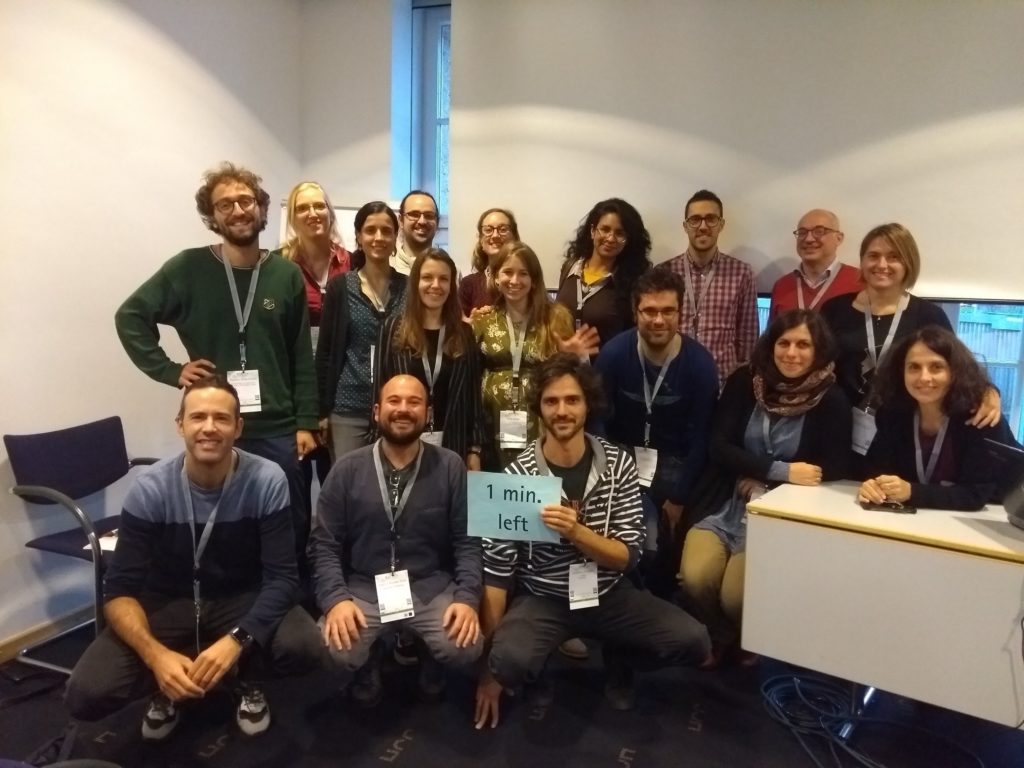
At the end of the session, we discussed about the current state of the art of ecosystem services research in the Mediterranean biome, as well as about potential activities to be organized by the working group in the future, including leading thematic sessions in in future ESP conferences. Click here to view the session presentations in PDF. If you work on Mediterranean systems and want to join the group, do not hesitate to contact us!
New publication of the ESP Mediterranean working group, May 2019
Members of the ESP Mediterranean working group have just published an article in Ecosystems and People. The paper presents a Driver-Pressure-State-Impact-Response (DPSIR) methodology that seeks to provide guidance for better ecosystem assessments encompassing the Mediterranean region (e.g. the recently approved IPBES global assessment or the IPBES regional assessments). This work is the result of the joint efforts by many ESP Mediterranean members to collect comprehensive information about the complexity and uniqueness of Mediterranean socio-ecological systems. The original idea of this study has its origin in a workshop held in the 2016 European ESP meeting in Antwerp.
The publication is open-access and can be downloaded from here.

The Mediterranean ESP working group leads a session in the next ESP 10 World conference (Hannover, Germany 21-25 October 2019)
Members of the BWG5 will host a session in the upcoming 2019 ESP World conference about “integration of methodological approaches to evaluate ecosystem services’ dynamics“.
Come and join us to present your work about how the integration of multiple approaches can help to improve assessments of ecosystem services in complex socio-ecological systems. Our session will include different oral presentations and an interactive discussion for developing more solid and robust assessments in this specific socio-ecological context in the future.
Besides, anyone interested in contributing to the Mediterranean ecosystem services working group is also very welcome to participate in the session. We are particularly looking forward to discussing with colleagues from ESP working groups on mapping, modeling and indicators. The call for abstracts is open now and until 10th June (https://www.espconference.org/esp10/wiki/426245/call-for-abstracts).
Members of the ESP Mediterranean working group participated in the First Lead Author’s meeting of the MedECC report.
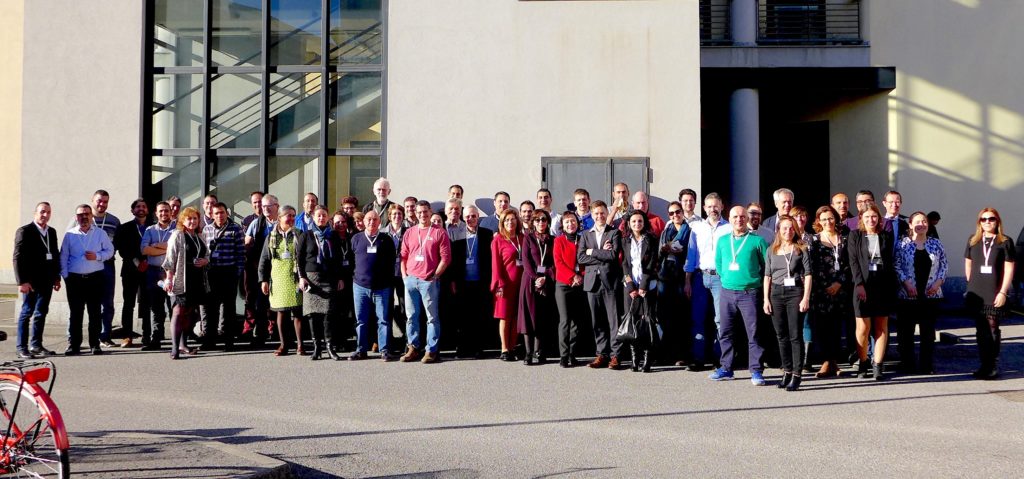
The first week of March, members of the BWG5 took part in the first lead author’s meeting of the MedECC report in Milán, Italy. The network of Mediterranean Experts on Climate and environmental Change (MedECC) is preparing a report on the current status and potential impacts of climate change in ecosystems of the Mediterranean basin using the most recent scientific evidence (there is a strong focus on the impacts of climate change on ecosystem service provision and human wellbeing). One of the main goals of this report is to bridge the gap between research and decision-making, contributing to the improvement of policies at national, regional, and local level by providing consolidated scientific knowledge and by responding to requests by decision-makers. The report will be published by the end of 2019.
The MedECC network collaborates hand in hand with Plan Bleu – Regional Activity Center of the United Nations Environment Programme (UNEP) Mediterranean Action Plan (MAP) –and the Union for the Mediterranean.
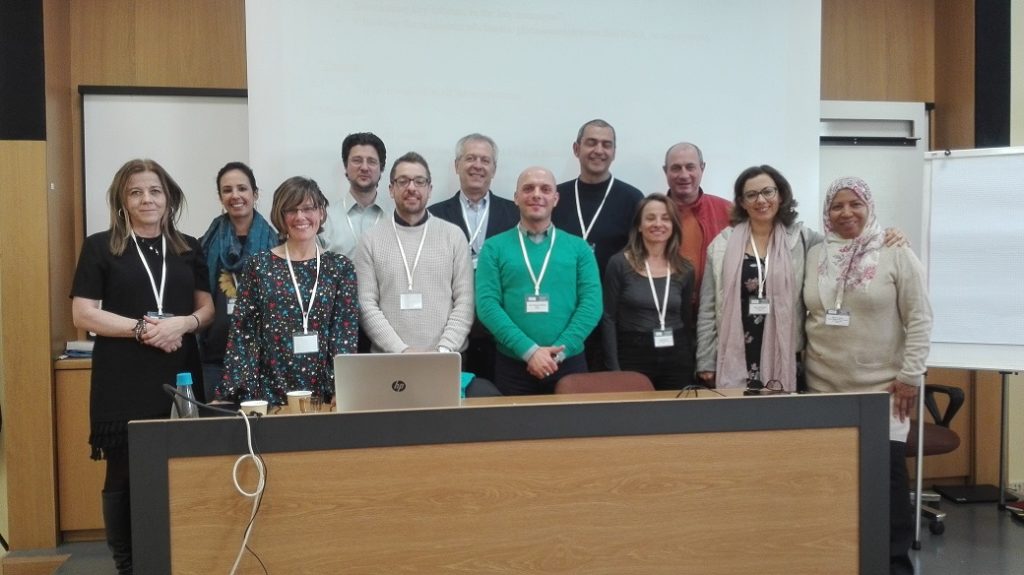
The ESP Mediterranean Working group at the ESP EU 2018 conference
Members of the ESP Mediterranean Working group met between the 15-19 of October in San Sebastián, Spain for the ESP Europe 2018 regional conference. This conference congregated the European ESP community under the theme ‘Ecosystem services in a changing world: moving from theory to practice’.
Among the more of 40 different sessions in the conference program, it was the session led by the Mediterranean working group on ‘Predicting the provision and demand of ecosystem services under global change in Mediterranean systems’. The session covered different topics within the common context of Mediterranean systems including mapping cultural ecosystem services, assessment of past and future changes in the provision of services by forests, impacts of conservation farming practices on services linked to agro-ecosystems and assessment of potential futures for Mediterranean wetlands. The session motivated an interesting discussion about potential venues for collaboration among members of the ESP BWG5 and with other biome and thematic groups. It also served as an excuse to meet more people interested in Mediterranean systems both in the formal context of the conference meeting and informally in the bar enjoying pintxos in the beautiful scenery of San Sebastián.
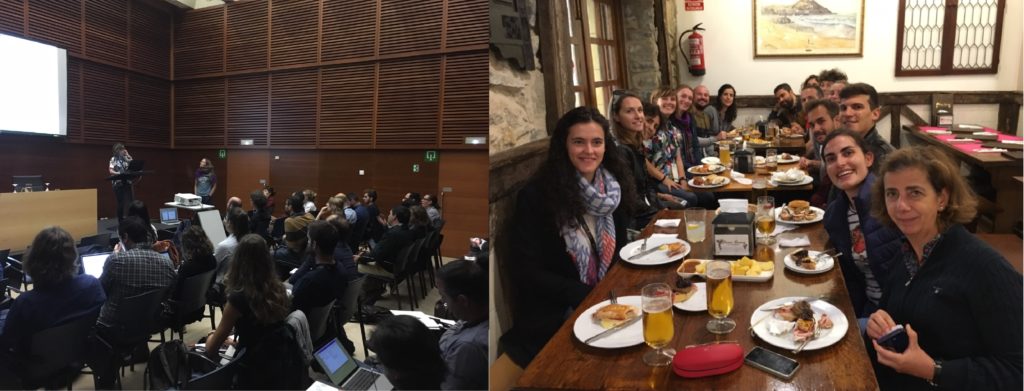
If you are interested in the session you can find more information here (including session’s abstracts)
If you work on Mediterranean systems and want to join the group, do not hesitate to contact us!
🗒 How are we assessing the future of Mediterranean forests? New publication by members of the ESP Mediterranean Working group, September 2018
In this new study, Alejandra Morán-Ordóñez, José V. Roces-Díaz, Lluis Brotons (members of the ESP Mediterranean working group) and colleagues, reviewed the available literature on the use of ecological models to predict global change environmental impacts, to answer the following questions: (1) what are the modelling approaches most commonly used to predict the condition and trends of biodiversity and ecosystem services under future scenarios of global change? (2) what are the drivers of change considered in future scenarios and at what scales? (3) what are the biodiversity/nature and ecosystem services indicators most commonly evaluated? The authors focused their review on the case study of Mediterranean forests. Future conservation of these systems must deal with multiple cultural, ecological and economic values, and complex dynamics of social change are likely to be exacerbated by global change.
The review shows that forecasting studies make relatively little use of modelling approaches accounting for actual ecological processes and feedbacks between different socio-ecological sectors; predictions are generally made on the basis of a single (mainly climate) or a few drivers of change; in general, there is a bias in the set of nature and ecosystem services indicators assessed; in particular, cultural services and human well-being are greatly underrepresented in the literature. In the publication, the authors argue that these shortfalls hamper our capacity to make the best use of predictive tools to inform decision-making for the conservation of Mediterranean forests in the context of global change.
You can access the full publication here.
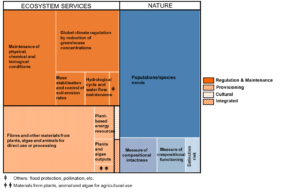
🗒New publication on the use of a GPS-based outdoor game to evaluate flows of recreational services, June 2018
In this study, Mario Balzán (member of the ESP Mediterranean Biome working group) and Iain Debono evaluated the flows of urban recreation ecosystem services through the use of a GPS-based outdoor game (Geocaching*4 worldwide outdoor game), using as case-study the island state of Malta .
Recreation is an important cultural ecosystem service and is one way in which communities experience the direct and indirect benefits arising from the experiential use of their environment. The recent rise in popularity of Global Positioning System (GPS) game applications, which combine information technology with an activity that increases mobility and encourages outdoor enjoyment, provides ecosystem service practitioners with an opportunity to make use of this georeferenced data to assess recreational ecosystem services. Geocaching is one such worldwide outdoor game. It has fixed points of incursion where people can hide and look for caches. This study explores the possibility of using geocaching data as a proxy for recreational ecosystems services in the Maltese Islands. A quantitative analysis of the georeferenced caches was used together with their visit rates and number of favourite points. This was supplemented by two questionnaires that investigated the preferences and experiences of both geocache placers (n=39) and hunters (n=21). Results show that the highest number of caches were placed and searched for in urban areas and that geocaching is strongly associated with the presence and accessibility of urban green infrastructure. The number of geocachers who stated preference for experiences in nature did not translate into high visit rates to sites of high conservation value (protected areas) but landscape value was significantly associated with recreational ecosystem services flow. The results presented here provide evidence that geocaching spatial data can act as an indicator for assessing and mapping recreational ecosystem services in urban environments and in cultural landscapes.
You can access the full publication here.
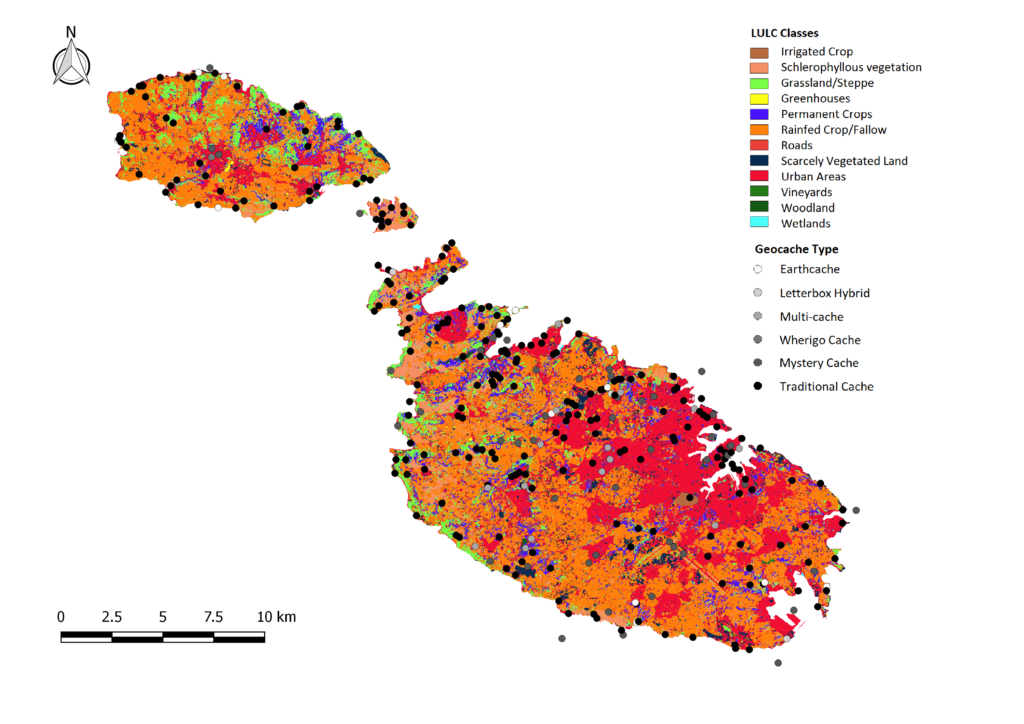
🗒 Members of the ESP Mediterranean working group contribute to a new publication on the role of economic actors, ecosystem services, socio-economic benefits and regional competitiveness in the agricultural landscape systems.
Comprehensive assessment of the cause-effects between agricultural landscape, ecosystem services, and regional competitiveness is complex and requires a range of ecological, economic and social aspects to be considered. This study was developed in the EU-FP7 CLAIM Project (www.claimproject.eu) and proposes a stakeholder-based assessment applied in nine European case-study areas (among which 4 carried-out in Mediterranean areas). The results outline that food production systems are generally perceived as the “pivot” element for creating value from landscapes. However, the importance of non-marketable, socio-cultural and environmental public good-type ecosystem services outweighs provision services in some case study areas. The paper concludes highlighting the large potential to valorise agricultural landscapes by taking advantage of the added value related to public good-type services, such as biodiversity, natural processes, protection function and cultural services.
The paper is available online on Land Use Policy
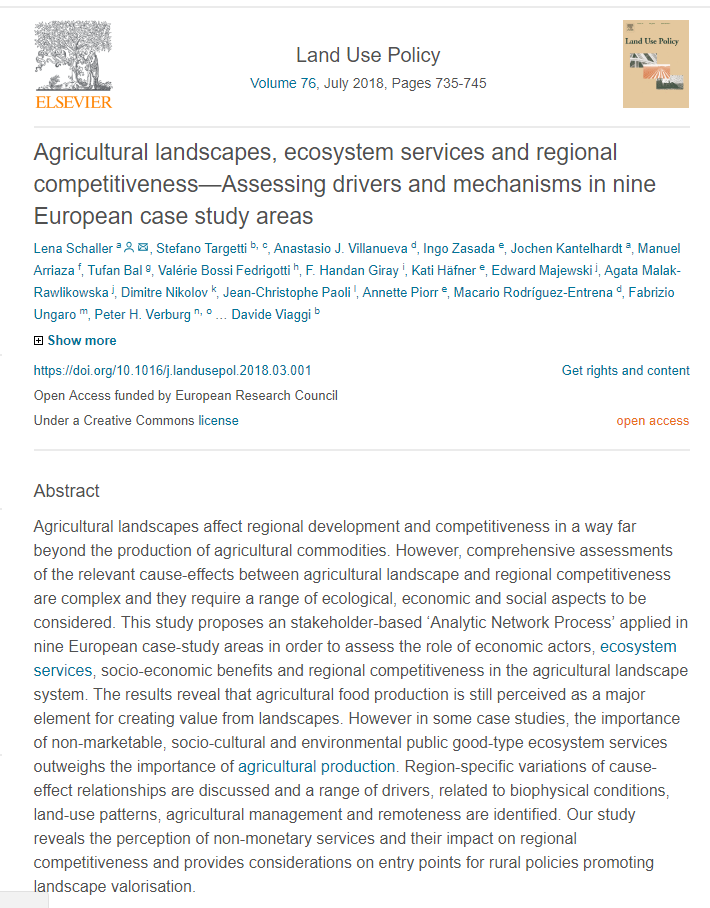
🗒 New publication on the impacts of urbanization in ecosystems services supply by members of the ESP Mediterranean working group, May 2018
Recently, Ana Paula García-Nieto and other colleagues of the ESP Mediterranean Biome Working group published an analysis of the “Impacts of urbanization around Mediterranean cities: Changes in ecosystem service supply”. For eight European and four North African cities, we have quantified changes in peri-urban land cover, for periods of sixteen years (1990–2006) in the Northern African, and twenty-two years (1990–2012) in the European cities. Based on land cover changes and using an expert based method, we derived quantitative estimates of the dynamics in the supply of twenty-seven ecosystem services.
The most significant land cover changes occur in the peri-urban zone, but little is known about how these changes affect the ecosystem service supply. The nature of land cover changes slightly differed between European and North African Mediterranean cities, but overall it increased in urban areas and decreased in agricultural land. The capacity of the peri-urban areas of Mediterranean cities to supply ecosystem service generally reduced over the last 20–30 years. For nine ecosystem service the potential supply actually increased for all four North African cities and three out of the eight European cities. Across all cities, the ecosystem service timber, wood fuel and religious and spiritual experience increased.
Given the expected increase of urban population in the Mediterranean Basin and the current knowledge of ecosystem service deficits in urban areas, the overall decrease in ecosystem service supply capacity of peri-urban areas is a risk for human wellbeing in the Mediterranean and poses a serious challenge for the Sustainable Development Goals in the Mediterranean basin.
You can access the full publication here: https://www.sciencedirect.com/science/article/pii/S1470160X18302371

🗒 Members of the ESP Mediterranean working group contribute to a new publication on global change effects on land management in the
Mediterranean region, May 2018
In this study, Žiga Malek and colleagues developed a future land use change scenario which demonstrates that sustainable development in the Mediterranean basin would allow for food security as well as the conservation and Mediterranean wetlands. You can access the full publication here.
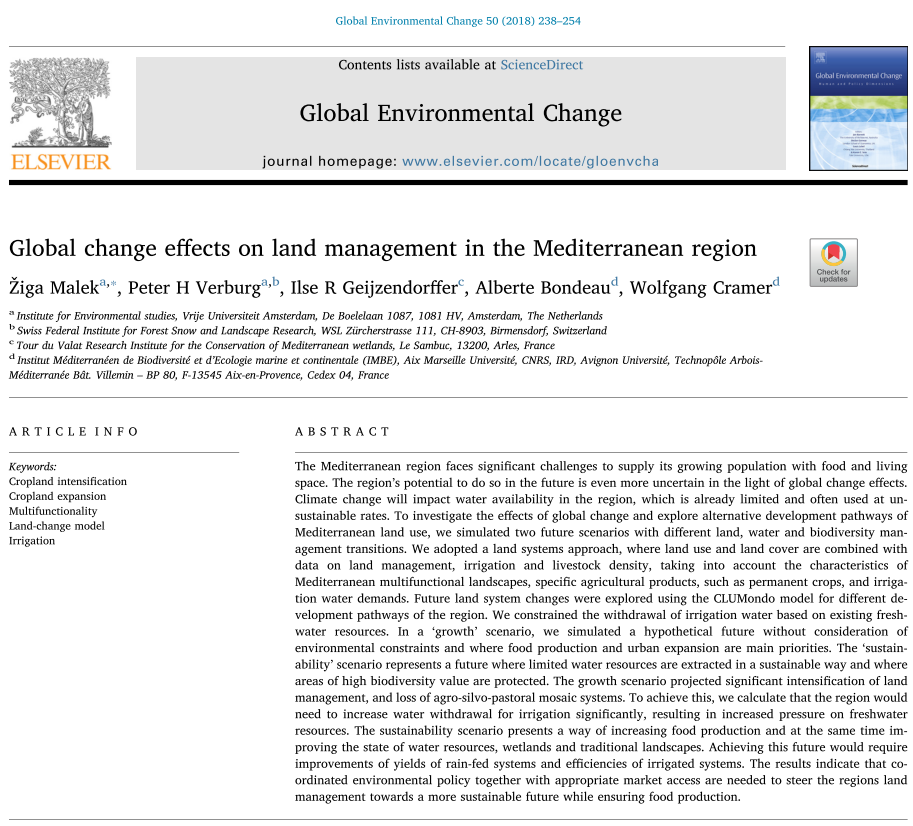
🗒 New publication on expert-based matrices for ES assessment from members of the ESP Mediterranean working group, May 2018
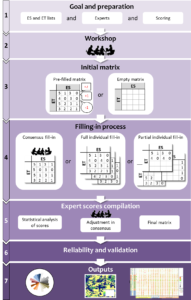
C. Sylvie Campagne and Philip K. Roche from the National Research Institute of Science and Technology for Environment and Agriculture, Aix-en-Provence, France, have just published the article May the matrix be with you! Guidelines for the application of expert-based matrix approach for ecosystem services assessment and mapping in One Ecosystem doi: 10.3897/oneeco.3.e24134.
This paper aims to propose a set of guidelines to produce Ecosystem Service (ES) matrices based on expert knowledge. Using expert elicitation enables quick and integrative ES scoring that can meet general demand for validated ES mapping and assessment at different scales. Nevertheless, guidance is needed on how to collect and to integrate expert knowledge to address some of the biases and limits of the expert elicitation method. The 7- steps approach presented in this study promotes cogency and coherency in the matrices produced. Besides, ES matrix should not only focus on ES central scores but also address the variabilities and uncertainties as part of the ES assessment. The analysis of these sources of variability allows the documentation of variations in the ES quantity but also an exploration into the lack of consensus or knowledge gaps that needs to be addressed.
You can access the full publication here.
📢 The Mediterranean ESP working group leads a session in the next ESP European conference (San Sebastián, 15-19 October 2018)
Members of the BWG5 lt will host a session in the next ESP conference about predicting the provision and demand of ecosystem services under global change. Come and join us to present your estimations of future perspective, projected changes in biodiversity, land use, supply and/or demand of ecosystem services. With different presentations and an interactive discussion, we aim to create the building blocks for a joint publication on the future projections for the Mediterranean basin. Besides, anyone interested in contributing to the Mediterranean ecosystem services working group is also very welcome to participate in the session. The call for abstracts is now open (until 4th of June).
New OPPLA webinar on how ecosystem services can/should be included in policy, September 2017
Last 18th of September, Ilse Geijzendorffer (Tour du Valat, and one of the lead team members of the ESP Mediterranean Working Group) together with a Marianne Kettunen (Institute for European Environmental Policy) gave an OPPLA webinar on How ecosystem services can/should be included in policy?. The session was organized within the framework of the webinar series of the OPERAS project. You can watch again the webinar here:
The content of the webinar is directly related to the recent publication of Ilse and other members of the ESP Mediterranean working group on ecosystem services and SDGs and Aichi targets. In the webinar, Ilse speaks in particular about the contribution of the ecosystem services provided by the Mediterranean wetlands.
The Mediterranean ESP working group leads a session in the next ESP global conference
Members of the BWG5 lead a session in the next ESP global conference that will take place in Shenzhen, China, from the 11-15 of December 2017. The session is entitled ‘Linking Green Infrastructure ecosystem condition and ecosystem services delivery: are Mediterranean systems different from others?’. You can find further information about the aims of the session here (under the biome groups sessions). Registration for the conference is open until the 26th of November.
Members of Mediterranean ESP working group at MedECC workshop, July 2017
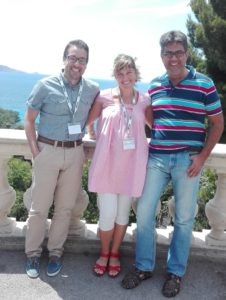
Four members of the ESP Mediterranean working group (Mario Balzan – Malta College of Arts, Ioannis Vogiatzakis – Open University of Cyprus, Céline Dubreuil – Plan Bleu, France – and Alejandra Morán – CREAF-CTFC, Spain), together with other 36 experts from across the Mediterranean Basin, participated in a workshop on Mediterranean Ecosystems and Ecosystem Services in Marseille, France, from the 17th to 19th of July. The workshop was organized by the MedECC (the network of Mediterranen Experts on Climate and Environmental Change; ) and Plan Bleu.
The objective of the workshop was to advance on the development of a comprehensive synthesis of the global change knowledge available for Mediterranean Basin ecosystems (both terrestrial and marine). Participants of the workshop worked hard during the three days to identify the main drivers of change impacting Mediterranean ecosystems, as well as their main current and future risks and vulnerabilities. The work in the report will continue during 2017 and 2018. The MedECC will also work closely with public and private decision-makers and stakeholders to guarantee the knowledge transfer between the science and policy.
If you are interested in contributing to the MedECC as an expert, you can contact the MedECC organization at [email protected] or fill this very short online survey to subscribe to their mailing list.
🗒New publication from ESP Mediterranean Working group, July 2017
Members of the ESP Mediterranean Biome Working group have just published an article on the importance of ecosystem services for Sustainable Development Goals (SDGs) or the Aichi Targets. In particular, the study explores how and which ecosystem services are currently considered in the SDGs and the Aichi Targets. The authors identify the information that is already available in current national ecosystem assessments, as well as the main knowledge gaps, for monitoring the progress towards the achievement of these goals.
The study highlights the fact that all ecosystem services categories (i.e. provisioning, regulating and cultural) are relevant for the Aichi Targets and the SDGs. However, there is a strong information bias towards the supply side of ecosystem services, while information on social behaviour and governance is lacking for ecosystem services flows.
For more information about this publication, please read here.
Ref. Geijzendorffer, I. R., Cohen-Shacham, E., Cord, A. F., Cramer, W., Guerra, C., & Martín-López, B. (2017). Ecosystem services in global sustainability policies. Environmental Science & Policy, 74, 40-48.
BWG 5 members participated at the XIV MEDECOS & AEET meeting in Seville, January 2017
Members of the ESP Mediterranean working group participated in the 2017 joint meeting of the International Society of Mediterranean Ecology (MEDECOS) and the Spanish Ecological Society (AEET), celebrated between the 31st of January and 4th of February in Seville, Spain. The main focus of the joint conference was the ecology and evolution of Mediterranean ecosystems and their species, from plants to animals and also microorganisms.
Apart from participating in the multiple interesting sessions that the conference offered, members of the ESP Mediterranean working group organized and led two symposia on the topic of Mediterranean Ecosystem Services: ‘Mediterranean Ecosystem Services’ and ‘Ecosystem functioning and services: challenges and risks in a changing world’. Contributions to these symposia addressed a wide range of aspects of the current research on ecosystem services in the Mediterranean biome, from evaluation of social perceptions of given ecosystems/species to mapping and quantitative modelling of ecosystem services.
The conference was also a good excuse to meet with colleagues and friends, visit the beautiful city of Seville and the Spanish National Park of Doñana, renowned Ramsar site and one of the main biodiversity hotspots in Europe because of its strategic importance for migratory birds traveling to Africa, among other reasons.
If you are interested in knowing more about the different sessions, symposia and contributions of the conference, you can find the full detailed program of the meeting here.
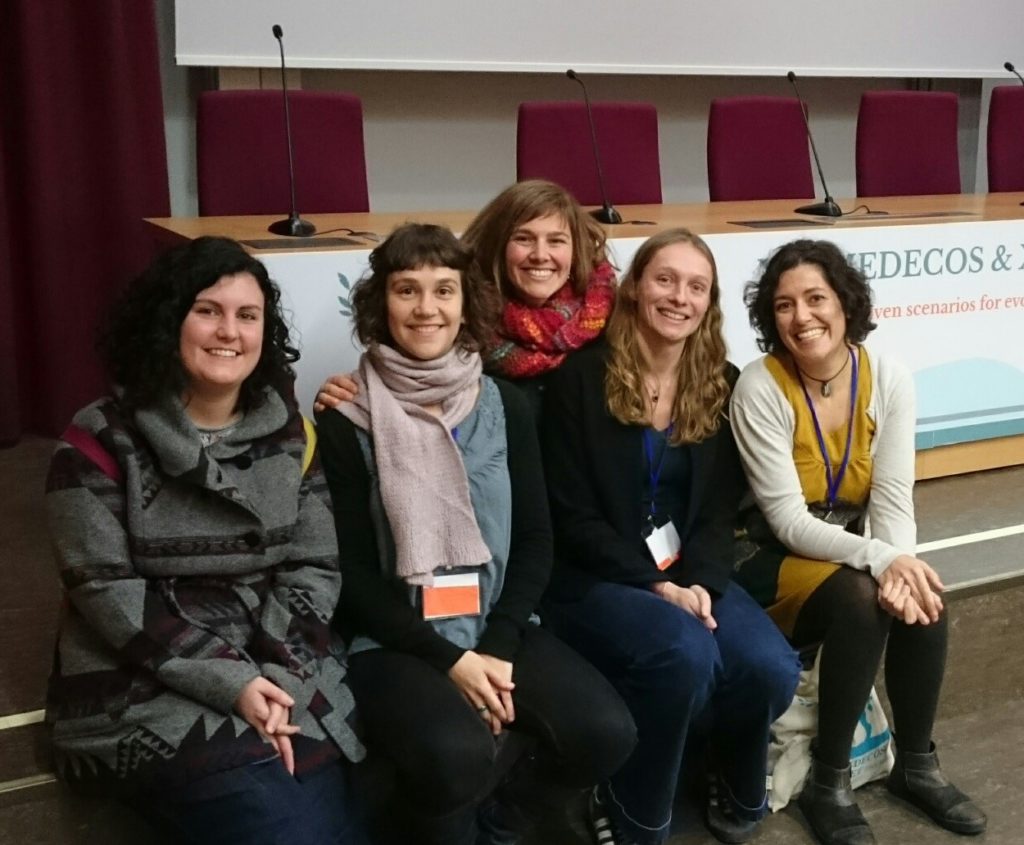
BWG 5 members participated in the International Conference of Ecological Sciences
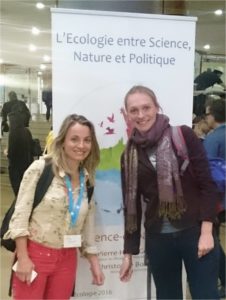
Several members of the Mediterranean Biome working group participated in the different sessions of the International Conference of Ecological Sciences celebrated in Marseille on the 25th – 28th of October. The conference also gave us the opportunity to meet Virginie Baldy, one of the chairs of the BIODIVMEX network project. BIODIVMEX is a research program developed within the framework of the MISTRALS initiative (Mediterranean Integrated Studies at Regional And Local Scales) and focused on achieving a better understanding of the environmental functioning of the Mediterranean basin in the context of ongoing global change. A very interesting collaboration for our working group!
At the Europe ESP Regional Conference 2018:
We organized a session on ‘Predicting the provision and demand of ecosystem services under global change in Mediterranean systems‘, Book of Abstracts, Presentations
BWG 5 members joined the European Ecosystem Services 2016 conference
On the week between the 19th to the 23rd September, many members of the Mediterranean Ecosystem services working group met at European Ecosystem Services 2016 conference celebrated in Antwerpen, Belgium. In addition from presentations in other sessions and symposia, the working group had its own working session on Tuesday afternoon. During this session, we worked on identifying the unique ecosystem services linked to Mediterranean systems and discussed about the challenges of quantifying these services using various applied methods. We particularly looked at the unique Mediterranean characteristics of food production, of soil erosion regulation and of cultural services. In addition, we´ve got an overview of the different case studies, disciplines, systems and methods represented by partners.

Part of the work initiated in September will continue at the next meeting of the working group at the MEDECOS conference 31st of January – 4th of February 2017. We hope to see you all there! (We are organizing a symposium on Mediterranean Ecosystem Services, don’t miss it out!)
? New August 2017! The BWG5 is working on an opinion piece with the ideas collected during the Antwerpen sessions. If anyone is interested in joining the current paper initiative do not hesitate to contact Ilse Geijzendorffer or Mario Balzan.
At the 8th global ESP conference in Stellenbosch, South Africa, November 2015
We organised a session on “Ecosystem services assessment in a Mediterranean context: challenges, methods, facts, solutions”. Although we were not with a large group, the presentations were of high quality and lead to some very interesting discussions and ideas for further activities (see our discussion Forum). Here we would like to share with you the presentations and posters that were presented there. They are presented in the order of the programme.
- Ilse Geijzendorffer et al., presentation “Ecosystem services assessment in a Mediterranean context: current and future methodological challenges“
- Nelly Bourlion et al., poster “Optimizing the production of goods and services of Mediterranean forest ecosystem in the context of global changes“
- Nelly Bourlion et al., posterd “Economic valuation of ecosystem services provided by Mediterranean wetlands in terms of adaptation to climate change“.
- Nelly Bourlion et al., presentation “Economic valuation of services provided by ecosystems, a tool for sustainable development in the Mediterraean?“
- Alon Lotan, presentation “Israel’s National Ecosystem Assessment – Challenges and preliminary findings“
- Ilse Geijzendorffer et al., presentation “Changes in ecosystem servivces supply in the Mediterranean basin. An expert opinion“
- Philip Roche, presentation “Comparing expert based capacity matrices with quantitative estimates of ecosystem services provided by mediterranean landscape“
- Ana Paula Garcia-Nieto et al., “Assessing ecosystem services supply from Mediterranean farming systems; data sources and methods issue challenges“
At the 7th Annual ESP Conference in San José, Costa Rica, September 2014
No separate Mediterranean session was organised, but several members of the Working Group presented on their own work, some of which was focused on the Mediterranean climate or the Mediterranean Basin. It was also at this Conference that the Mediterranean Ecosystem services Working Group refocused itself and decided upon a short list of activities and papers that will be launched in the near future.
For more information please contact Ilse Geijzendorffer or Emmanuelle Cohen-Shacham
ACCEPTED: Book chapter “Ecosystem services supplied by Mediterranean Basin ecosystems.”
Under the coordination of Berta Martín-López, several of the Working Group members worked together for a chapter for the Handbook of Ecosystem Services edited by Roy Haines-Young, Marion Potschin, Robert Fish and R. Kerry Turner, entitled Ecosystem services supplied by Mediterranean Basin ecosystems. We have recently received news that this chapter has now been accepted for publication.
This chapter presents how the long co-evolution between human societies and nature in the Mediterranean Basin has promoted multifunctional landscapes that provide a broad spectrum of ecosystem services to society. However, the extensive and traditional management of many Mediterranean landscapes is being replaced by more intensive land management practices, as well as by land-abandonment, often resulting in a deterioration of regulating and cultural services. This observation guides the storyline of the chapter, which eends with some insights for Mediterranean ecosystems management.
At the 6th Annual ESP Conference in Bali, August 2013
We organized a session on “Practical application of the ecosystem service concept in Mediterranean Type Ecosystems (MTE)“, towards an MTE assessment.
The workshop aimed to:
- Present tools developed for assessing ecosystem services in MTEs;
- Present case studies in select MTEs (France, Portugal, Israel);
- Discuss how a comprehensive MTE ecosystem assessment might be conducted, and engage participants for future collaboration on this project.
For more information please contact Emmanuelle Cohen-Shacham
